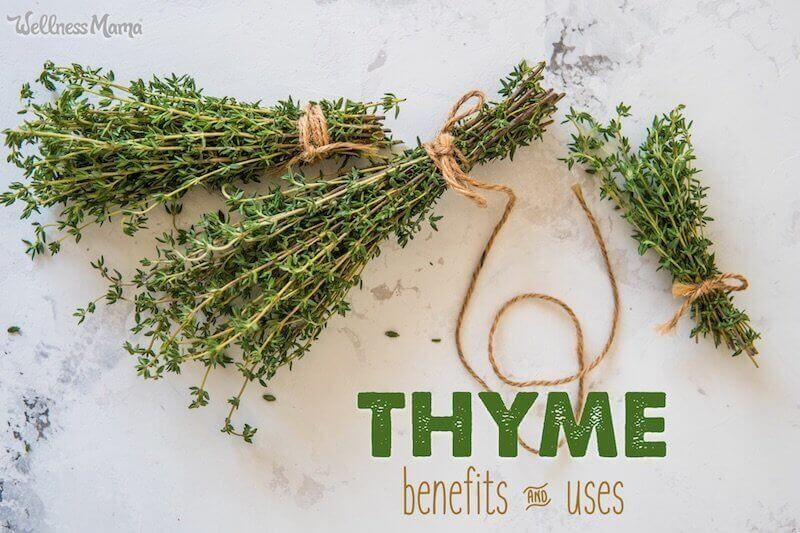The Health Benefits Of Rosemary & Thyme: Culinary And Medicinal Uses

Table of Contents
Rosemary's Health Benefits
Rosemary for Brain Health
Rosemary has long been associated with improved memory and cognitive function. Studies suggest that its aromatic compounds may enhance memory recall, focus, and concentration.
- Improved Memory Recall: Research indicates that inhaling rosemary essential oil can positively impact memory performance, particularly in tasks requiring verbal recall.
- Enhanced Focus and Concentration: The stimulating aroma of rosemary may help improve alertness and concentration, making it a potential aid for studying or performing tasks requiring mental acuity.
- Rosmarinic Acid's Role: Rosmarinic acid, a potent antioxidant found in rosemary, is believed to play a significant role in these cognitive-enhancing effects by protecting brain cells from damage.
The mechanisms behind rosemary's brain-boosting effects likely involve improved blood flow to the brain and protection against oxidative stress, which can impair cognitive function.
Rosemary's Antioxidant and Anti-Inflammatory Properties
Rosemary is exceptionally rich in antioxidants, boasting compounds like carnosic acid and caffeic acid. These antioxidants neutralize harmful free radicals, reducing oxidative stress and inflammation throughout the body.
- Carnosic Acid's Protective Effects: Carnosic acid is a particularly potent antioxidant in rosemary, exhibiting strong anti-inflammatory and neuroprotective properties.
- Prevention of Chronic Diseases: By combatting inflammation and oxidative stress, rosemary may play a role in reducing the risk of chronic diseases such as heart disease, cancer, and neurodegenerative disorders.
- Skin Health Benefits: Rosemary's antioxidant and anti-inflammatory properties also make it beneficial for skin health, potentially helping to soothe irritated skin and reduce the appearance of wrinkles.
Culinary Uses of Rosemary
Rosemary's strong, slightly piney flavor makes it a versatile culinary herb. It adds a delicious depth to many dishes.
- Roasted Meats: Rosemary pairs perfectly with roasted lamb, chicken, and pork, infusing the meat with a savory aroma and flavor.
- Soups and Stews: A sprig or two of rosemary adds a fragrant touch to hearty soups and stews, complementing vegetables and beans beautifully.
- Bread and Baked Goods: Rosemary adds a unique twist to bread, focaccia, and other baked goods, creating a flavorful and aromatic experience.
Thyme's Health Benefits
Thyme's Immune-Boosting Properties
Thyme is renowned for its immune-boosting properties, primarily due to its high concentration of thymol.
- Thymol's Antimicrobial and Antiviral Properties: Thymol, a bioactive compound in thyme, exhibits potent antimicrobial and antiviral effects, helping the body fight off infections.
- Cold and Flu Relief: Thyme tea is a traditional remedy for colds and flu, potentially easing symptoms and shortening the duration of illness.
- Strengthening Natural Defenses: Thyme supports the immune system by stimulating the production of antibodies and enhancing the body's natural defenses against pathogens.
Thyme's Antibacterial and Antifungal Effects
Thyme oil and extracts have demonstrated significant antibacterial and antifungal activity against a range of microorganisms.
- Effective Against Bacteria and Fungi: Studies have shown thyme's effectiveness against various bacteria, including Staphylococcus aureus and Escherichia coli, as well as certain fungi.
- Potential Applications: Thyme's antibacterial and antifungal properties have potential applications in treating skin infections, digestive issues, and other ailments. Further research is ongoing.
Culinary Uses of Thyme
Thyme, with its earthy and slightly lemony flavor, is another culinary star.
- Soups and Stews: Thyme is a staple in many soups and stews, adding warmth and complexity to the flavor profile.
- Roasted Vegetables: Thyme complements roasted vegetables beautifully, enhancing their natural flavors.
- Chicken and Fish Dishes: Thyme's delicate flavor pairs well with chicken, fish, and other lighter proteins.
Rosemary and Thyme Together: Synergistic Effects
Combining rosemary and thyme in culinary preparations or herbal blends may offer synergistic health benefits. The combined antioxidant and anti-inflammatory power of these herbs could lead to enhanced protection against disease.
- Enhanced Antioxidant Capacity: Using both herbs together may create a more potent antioxidant effect than using either herb individually.
- Complementary Flavors: In cooking, rosemary and thyme offer a delightful combination of flavors and aromas, complementing each other perfectly.
- Herbal Blends: Many herbal blends combine rosemary and thyme for their combined medicinal benefits.
Explore recipes that feature both herbs, such as a roasted chicken with rosemary and thyme, or a hearty soup with both herbs added for a boost of flavor and potential health benefits.
Conclusion
The health benefits of rosemary and thyme are undeniable, extending beyond their delicious culinary applications. From boosting brain health and supporting the immune system to offering potent antioxidant and anti-inflammatory protection, these versatile herbs offer a multitude of advantages. Their diverse culinary uses allow for easy integration into your daily diet. Discover the amazing health benefits of rosemary and thyme today! Start exploring the culinary and medicinal uses of these powerful herbs to enhance your well-being. [Link to a rosemary and thyme recipe or related article]

Featured Posts
-
 Publishers Weekly Interview Molly Jong Discusses Tomorrow Is A New Day
May 31, 2025
Publishers Weekly Interview Molly Jong Discusses Tomorrow Is A New Day
May 31, 2025 -
 Bernard Kerik Former Nypd Commissioner Dies At 69
May 31, 2025
Bernard Kerik Former Nypd Commissioner Dies At 69
May 31, 2025 -
 Understanding The Good Life Values Priorities And Purpose
May 31, 2025
Understanding The Good Life Values Priorities And Purpose
May 31, 2025 -
 Designing The Good Life A Practical Guide
May 31, 2025
Designing The Good Life A Practical Guide
May 31, 2025 -
 Kontuziyata Na Grigor Dimitrov Aktualna Informatsiya I Analiz
May 31, 2025
Kontuziyata Na Grigor Dimitrov Aktualna Informatsiya I Analiz
May 31, 2025
